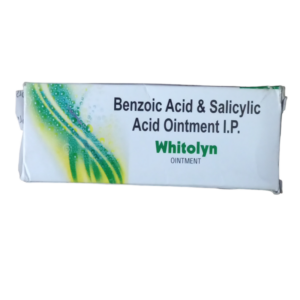BENZOIC ACID + SALIYCLIC ACID
Benzoic Acid: Benzoic acid is a medication used as an antifungal agent and a preservative in various products. It is also sometimes used as a topical treatment for skin conditions such as acne and psoriasis.
The exact mechanism of action of benzoic acid is not well understood. However, it is believed to have antifungal properties by inhibiting the growth and reproduction of fungi, which helps fight off fungal infections. It also has keratolytic properties, meaning it helps to soften and exfoliate the outer layer of the skin, improving symptoms of skin conditions.
The dosage of benzoic acid varies depending on the specific product and the condition being treated. It is available in various forms such as creams, lotions, and ointments, and the dosage instructions provided by the manufacturer should be followed.
Side effects of benzoic acid are generally mild and uncommon. Some possible side effects include skin irritation, redness, itching, or dryness at the application site. If these side effects persist or worsen, it is advisable to consult a healthcare professional.
It is worth noting that benzoic acid is generally safe for topical use. However, if you experience any severe allergic reactions or unusual side effects, it is important to discontinue use and seek medical attention immediately.
Saliyclic Acid: Salicylic acid is a medication primarily used topically to treat various skin conditions such as acne, psoriasis, and warts. It belongs to a class of drugs known as keratolytics, which work by removing the outer layer of the skin and promoting skin cell turnover.
When applied to the skin, salicylic acid helps to unclog pores by dissolving dead skin cells and reducing inflammation. It also has mild antiseptic properties that can help prevent bacterial growth on the skin.
Salicylic acid is available in various forms, including creams, gels, lotions, and ointments, with concentrations ranging from 0.5% to 10%. The specific dosage and frequency of application depend on the condition being treated and should be determined by a healthcare professional.
Common side effects of salicylic acid include skin irritation, stinging, redness, and peeling. These side effects are usually mild and temporary. However, if severe irritation or allergic reactions occur, such as rash, itching, swelling, or trouble breathing, it is important to seek medical attention.
Salicylic acid should be used with caution in individuals with hypersensitivity to salicylates, pregnant or breastfeeding women, and those with kidney problems. It should not be used on open wounds, sunburned skin, or areas of the skin with eczema or irritated skin.
In summary, salicylic acid is a topical medication used to treat various skin conditions. It works by exfoliating the skin and promoting cell turnover. It is generally safe when used as directed, but can cause temporary skin irritation and other side effects.

